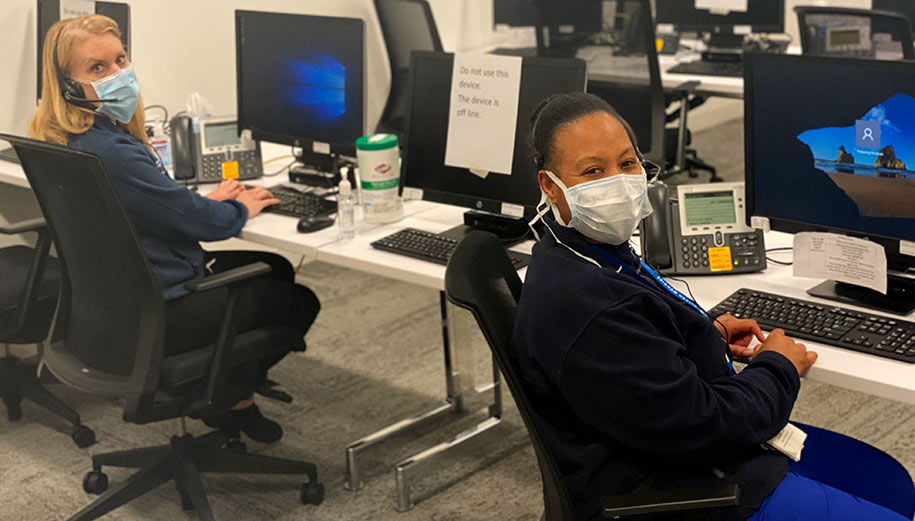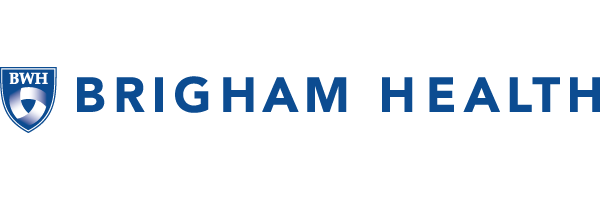
Nancy Joseph, MSN, RN, was about to wrap up her shift in the Partners COVID-19 Call Center one evening when a teenager called with concerns about a family member.
"I knew off the bat that the person was really sick and needed to go to the Emergency Department," said Joseph, a nurse in the Primary Care Float Pool who has been working in the Call Center for the last month. "The family member had already been evaluated but was clearly worsening."
Before instructing the caller to hang up and dial 911, Joseph coached her on what she needed to say to convey the urgency of the situation.
"I told her I'd call her back in five minutes, and when I did, the ambulance had already come to take her family member to the hospital," Joseph recalled. "I needed to make sure the caller was ok and felt supported at home. I also wanted her to know that the hospital would take good care of her loved one and that she did the right thing by calling."
For patients and loved ones who are sick, isolated or afraid, the Partners COVID-19 Call Center is more than a hotline. It's a lifeline. That's because the hundreds of calls per day are answered by nurses like Joseph who are skilled in gathering information and able to build trusting relationships with patients, even over the phone.
The center was established at the beginning of March to provide guidance to clinicians, patients and the public about COVID-19. Staffed by nurses throughout the Partners HealthCare system, the center has become a vital resource in offering information and education to callers.
"These patients call the hotline to talk to a nurse," said Lisa Dutton, MSN, RN-BC, NE-BC, professional development manager for Ambulatory Services. "They have been socially isolated for weeks with varying degrees of stay-at-home orders and are faced with mainstream media news about the Coronavirus day in and day out. They call us for validation, support, reassurance and guidance. It is clear to us at the Call Center why nurses are one of the most trustworthy professions in this country."
Michele McCullough, BSN, RN-BC, a nurse in the Brigham Plastic Surgery Clinic, has been part of the Call Center since it opened. In her clinic role, she frequently speaks with patients over the phone who can't immediately be seen in person. "Ambulatory nurses are used to asking the right questions to get the information we need about what a patient is experiencing," she said. "It's no different with COVID."
McCullough said that nurses are able to talk with callers to better understand their symptoms and risks and help connect them to the right resources, such as testing or a virtual visit with a physician.
"But there's a lot more to it than screening," she said. "We work with them to navigate all kinds of issues to get them what they need."
For example, some callers do not have internet access, so they can't participate in a virtual visit with a physician. Other callers are homeless and need to be tested so they can check into a shelter.
"I had a patient who needed a test one day, but she had no means of transportation," said McCullough. "She ran through various options of taking public transportation or a cab, which we couldn't allow her to do in case she was exposing others. We ended up sending an ambulance to go to her home and test her there."
When the center first opened, most calls lasted several minutes as nurses shared information about COVID-19 and guidance on testing.
In the past two weeks, the center has evolved into a triage call center. "We are now triaging truly sick patients in the community, many of whom are afraid to go to the ED or scared of what neighbors will think if an ambulance comes to their home," said Joseph. "What's frightening is how sick some of these patients are and how long they have waited before asking for help."
Christine Lutfy, BSN, RN, of Cardiac Rehabilitation at Brigham and Women's/Mass General Health Care Center in Foxboro, agreed. "Most individuals are calling with fear or worry about the virus not only for themselves, but also their family members," she said. "As the weeks have progressed, the calls have become more complicated and require thoughtful assessment to meet each patient's individual needs."
Some patients call frequently to report updates or ask questions as their symptoms and conditions change.
"We are able to give some continuity of care because we get to know these patients," said McCullough. "If someone called last week with mild symptoms but calls again with more critical needs, we are able to quickly respond and direct them to emergent care if needed."
Teamwork among the Call Center staff has been essential, as hundreds of calls pour in each day. Nurses spread out at a safe distance among several rooms at Assembly Row to answer calls, assist each other and ensure that everyone receives the information they need.
"We're all from different departments and even different hospitals, but we share the same goal of helping our callers," said McCullough. "We learn from each other. We may have a pregnant or postpartum mom calling us, and we're all able to learn from our nurses who specialize in the care of women and newborns and are working with us in the center."
Joseph agreed. "I'm in awe of the expertise, cohesiveness and collaboration among all the nurses in the Call Center," she said. "When we have a brief lull in calls, we talk about not only work, but also what's going on at home for each of us. Partners has brought together a group of nurse friends who had never met each other before."
"Everyone I have met has exhibited patience, kindness, knowledge and compassion," said Lutfy. "The positivity that I have experienced at the hotline has given me hope during this difficult time. I am thankful for this experience and especially being able to do my part during this health crisis."
Nurses are committed to lifelong learning, and the idea of advancing her knowledge in a different area was the spark that drew McCullough's interest in the Call Center.
"I knew right away that I wanted to be part of it," she said. "I thought it would be a great opportunity to learn more about COVID-19. With so much changing day to day in terms of our processes and what we know about the virus, there's always something new."
Joseph says that her experience in the call center has strengthened her skills in providing patient resources.
"For me, the Call Center has confirmed the true role of the nurse in health care. We are indeed the glue when it comes to advocating for care for our patients, whether someone is clinically acute at this moment or may need care in the next day or month," she said. "I can assess if someone needs respiratory support right now or help someone who is facing homelessness determine what resources they may need."
Dutton praised the extraordinary efforts she has witnessed among nurses in the Call Center.
"We have amazing nurses! We already knew that, but to listen to, observe and assist nurses from across the Partners system as they jumped into a new environment has been an honor," she said. "We are fielding calls from many angles, emotions, concerns and outcomes. The nurses have easily been able to triage, educate, adapt and reassure our patient, provider and staff callers. These nurses truly are transformational leaders."
For over a century, a leader in patient care, medical education and research, with expertise in virtually every specialty of medicine and surgery.
About BWH
